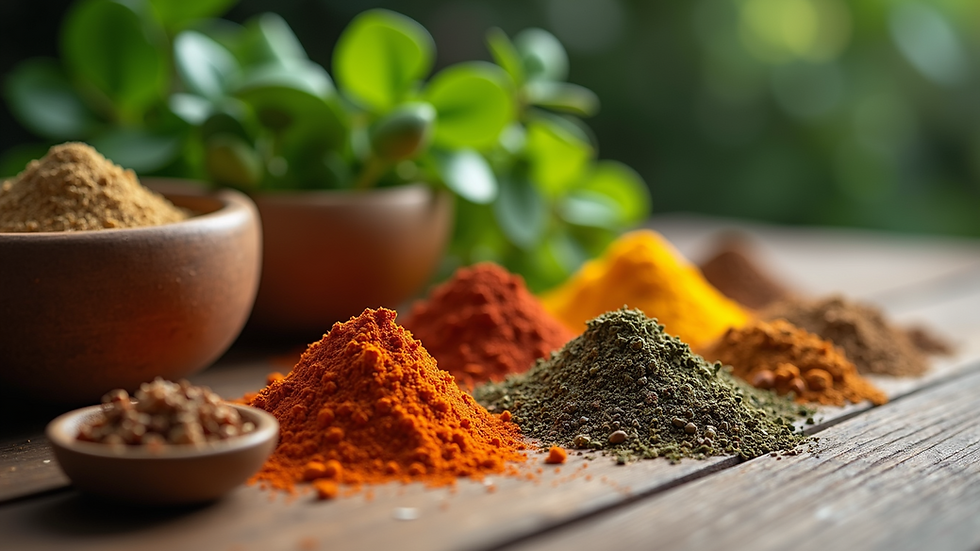The Role of Herbs in Traditional Ayurvedic Practices
- prexim
- Sep 22, 2025
- 3 min read
Ayurveda, the ancient Indian system of medicine, has been practiced for thousands of years. Central to this holistic approach to health are ayurvedic herbs, which play a vital role in maintaining balance and promoting wellness. These herbs are used to treat various ailments, improve vitality, and support the body's natural healing processes. This article explores the significance of these herbs in traditional Ayurvedic practices, their benefits, and how they continue to influence modern health care.
Understanding Ayurvedic Herbs and Their Importance
Ayurvedic herbs are natural plants and botanicals that have been used in Ayurveda to restore harmony between the body, mind, and spirit. Each herb has unique properties that target specific doshas (body energies) - Vata, Pitta, and Kapha. The balance of these doshas is essential for good health.
Some commonly used Ayurvedic herbs include:
Ashwagandha - Known for its adaptogenic properties, it helps reduce stress and improve stamina.
Tulsi (Holy Basil) - Acts as an immune booster and supports respiratory health.
Neem - Used for its antibacterial and detoxifying effects.
Turmeric - Famous for its anti-inflammatory and antioxidant benefits.
These herbs are often combined in formulations to enhance their effectiveness. They can be consumed as powders, teas, oils, or supplements.

The use of these herbs is not just about treating symptoms but about addressing the root cause of illness. Ayurveda emphasizes prevention and maintaining balance through diet, lifestyle, and herbal remedies.
How Ayurvedic Herbs Support Health and Wellness
Ayurvedic herbs contribute to health in multiple ways. They help detoxify the body, improve digestion, boost immunity, and promote mental clarity. Here are some specific benefits:
Detoxification: Herbs like Triphala help cleanse the digestive tract and remove toxins.
Immune Support: Tulsi and Guduchi strengthen the immune system to fight infections.
Stress Relief: Ashwagandha and Brahmi calm the nervous system and reduce anxiety.
Anti-inflammatory Effects: Turmeric and Guggulu reduce inflammation and support joint health.
Digestive Health: Ginger and fennel improve digestion and reduce bloating.
Incorporating these herbs into daily routines can lead to improved energy levels, better sleep, and enhanced overall well-being.

For those interested in natural health solutions, exploring ayurvedic herbal supplements can be a practical way to experience the benefits of these time-tested remedies.
What is the Best Ayurvedic Herb?
Choosing the best Ayurvedic herb depends on individual health needs and dosha imbalances. However, some herbs are widely regarded for their broad-spectrum benefits:
Ashwagandha: Often called the "Indian ginseng," it is prized for its ability to enhance vitality, reduce stress, and improve cognitive function.
Turmeric: Known globally for its powerful anti-inflammatory and antioxidant properties, it supports joint health and skin vitality.
Tulsi: Revered as a sacred herb, it helps with respiratory issues, immunity, and stress management.
Each herb has its unique strengths, and the best choice varies from person to person. Consulting an Ayurvedic practitioner can help tailor herbal use to individual constitution and health goals.

Practical Ways to Incorporate Ayurvedic Herbs into Daily Life
Integrating Ayurvedic herbs into your routine can be simple and effective. Here are some actionable tips:
Herbal Teas: Brew teas using Tulsi, ginger, or cinnamon to support digestion and immunity.
Cooking Spices: Use turmeric, cumin, and coriander in daily cooking for flavor and health benefits.
Supplements: Consider high-quality ayurvedic herbal supplements for targeted support.
Herbal Oils: Apply oils infused with herbs like Brahmi or Neem for skin and hair care.
Daily Rituals: Start the day with warm water mixed with lemon and a pinch of Triphala powder to aid detoxification.
Remember to start with small amounts and observe how your body responds. Consistency is key to experiencing the full benefits of Ayurvedic herbs.
Embracing the Wisdom of Ayurvedic Herbs for Modern Wellness
The role of Ayurvedic herbs in traditional practices highlights a profound understanding of nature’s healing power. These herbs offer a natural, holistic approach to health that complements modern medicine. By embracing Ayurvedic herbs, individuals can take proactive steps toward balanced living and long-term wellness.
Whether you are seeking to reduce stress, improve digestion, or boost immunity, Ayurvedic herbs provide a versatile and accessible solution. Their continued relevance in contemporary health practices underscores their timeless value.
Explore the rich heritage of Ayurveda and consider incorporating these herbs into your lifestyle for a healthier, more harmonious life.




Comments